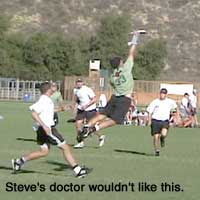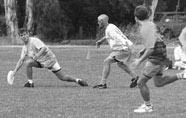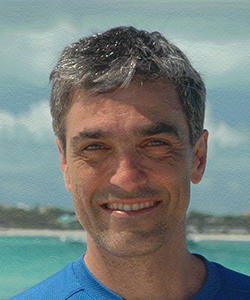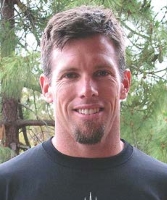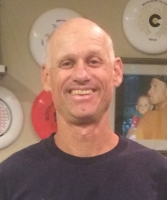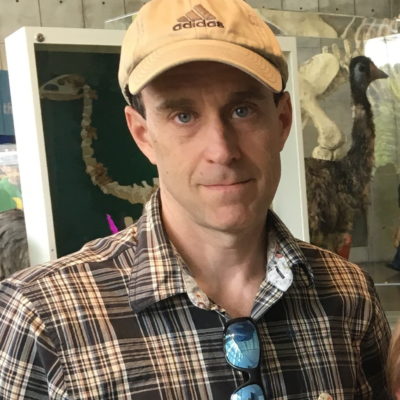Class of 2017
Steve Dugan
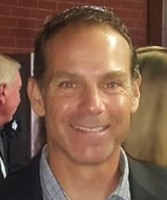
Steve Dugan
Hometown: Santa Barbara, CA
Born: 1970 (Age 53)
Career Information
College
Grandmasters
National Team
U.S. National Championships
2x U.S. Club Champion (2000, 2001)
1x U.S. Grandmasters Champion (2013)
3x U.S. Club Runner Up (1998, 1999, 2007)
1x U.S. Masters Runner Up (2011)
1x U.S. Grandmasters Runner Up (2015)
World Championships
3x World Champion (2002, 2008, 2011)
2x World Runner Up (2001, 2004)
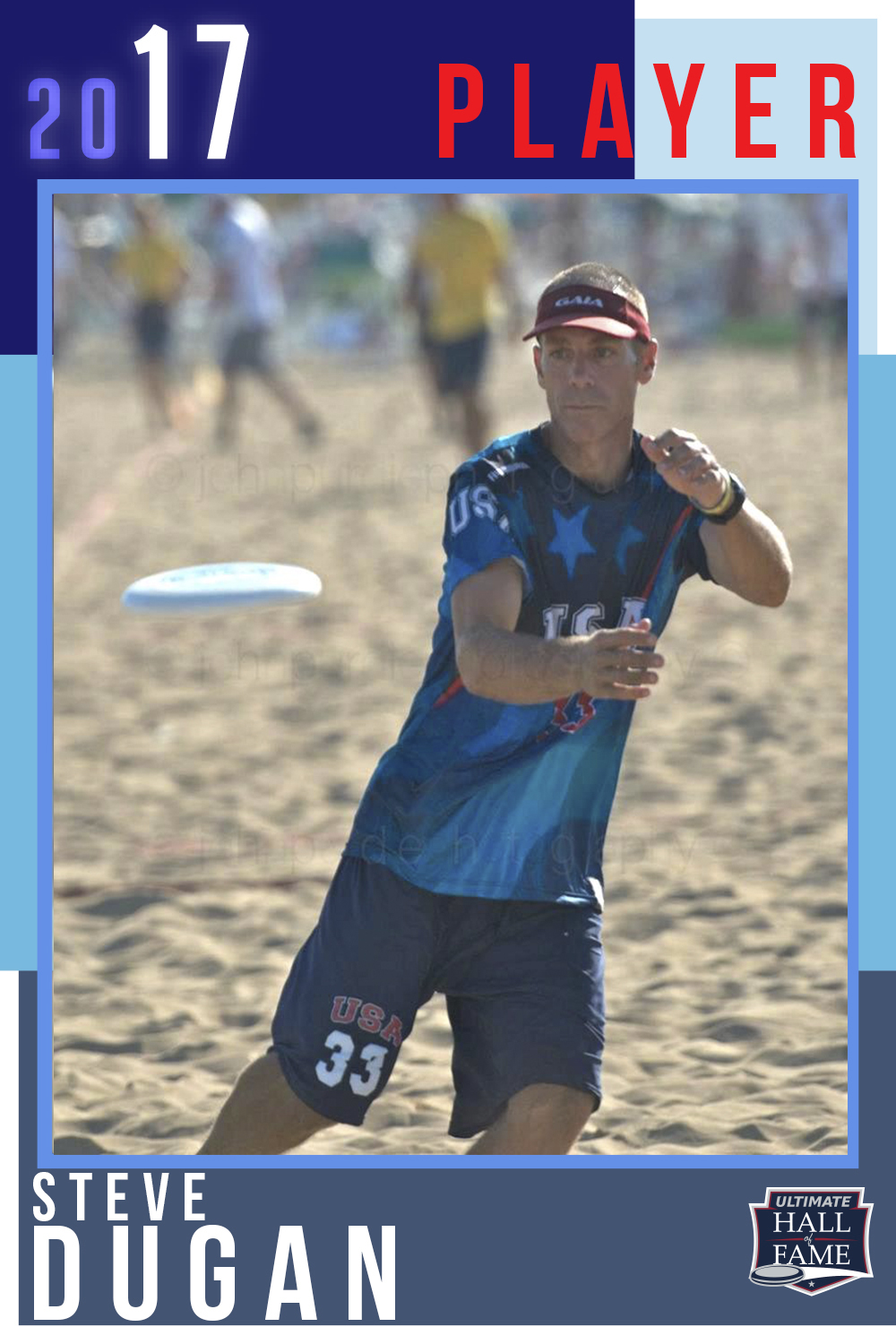
Steve Dugan was destined to become the driving force that would reestablish the legendary Santa Barbara Condors as the best team in the sport in the early 2000s. As the captain, and acknowledged heart and soul of the team, Steve’s leadership, strategic game planning and intelligent and consistent play helped the Condors reach the finals at the National Championships five times during the six-year period from 1998-2003, which included back-to-back titles in 2000 and 2001. His team also played in two WFDF World Championship finals in 2002 and 2004, winning the title in 2002. Playing primarily at the handler position, Steve was regarded as one of the most skilled throwers of his era, with the ability to break the mark, bust a zone or huck it deep with equal aplomb. His work ethic set a high standard at practice, which inspired his teammates to do the same, while his relentless effort in games left opponents gasping and broken. Steve earned the respect of his peers as a player and person of high character and integrity.
Contributions & Service
- 1994-2002: Santa Barbara Classic Ultimate Tournament Organizer
- 2002-2006: Junior High School Ultimate Clinic Coach
- 2008-2010: UCSB Burning Skirts Coach
- 2011-2012: UCSB Black Tide Coach
- 2013-2015: Santa Barbara Condors Coach
- 2015-2016: Southern California Sectional Coordinator
Championship Tournaments
U.S. National Championships
| Year | Team | Placement |
|---|---|---|
| 1991 | UCSB (Black Tide) College Men | Semifinals |
| 1991 | Condors Club Men | Regionals |
| 1992 | UCSB (Black Tide) College Men | Regionals |
| 1992 | Condors Club Men | Regionals |
| 1993 | UCSB (Black Tide) College Men | Semifinals |
| 1994 | Condors Club Men | Regionals |
| 1995 | Condors Club Men | Regionals |
| 1996 | Rhino Club Men | Regionals |
| 1997 | Condors Club Men | 7th |
| 1998 | Condors Club Men | 2nd |
| 1999 | Condors Club Men | 2nd |
| 2000 | Condors Club Men | 1st |
| 2001 | Condors Club Men | 1st |
| 2002 | Condors Club Men | 5th |
| 2003 | Condors Club Men | Semifinals |
| 2004 | Condors Club Men | 7th |
| 2005 | Gendors Club Mixed | Regionals |
| 2006 | Gendors Club Mixed | Semifinals |
| 2007 | Condors Club Men | 2nd |
| 2008 | Condors Club Men | 13th |
| 2009 | Beyonders Masters Men | Semifinals |
| 2010 | Confluence Masters Men | Pool Play |
| 2011 | Beyonders Masters Men | 2nd |
| 2012 | Reckon Masters Men | Semifinals |
| 2012 | No Country Grandmasters Men | 5th |
| 2013 | No Country Grandmasters Men | 1st |
| 2014 | No Country Grandmasters Men | 3rd |
| 2015 | No Country Grandmasters Men | 2nd |
World Championships
| Year | Tournament | Team | Placement |
|---|---|---|---|
| 1993 | WUCC Madison, Wisconsin | Condors Club Men | Pool Play |
| 1997 | WUCC Vancouver, BC, Canada | Condors Club Men | Pool Play |
| 1999 | WUCC St. Andrews, Scotland | Condors Club Men | Semifinals |
| 2001 | World Games Akita, Japan | U.S. National Team Club Men | 2nd |
| 2002 | WUCC Honolulu, Hawaii | Condors Club Men | 1st |
| 2004 | WUGC Turku, Finland | Condors Club Men | 2nd |
| 2008 | WUGC Vancouver, BC, Canada | Death or Glory Club Men | 1st |
| 2011 | WCBU Ligano Sabbiadoro, Italy | U.S. National Team Club Men | 1st |
Interview
What position(s) (e.g., handler, deep cutter, middle middle) did you usually play?
Handler, handler defender and point in zone.
Please describe your major accomplishments - both as a teammate and individual.
I will focus mainly on my accomplishments while I was playing at my best against the best in the open division. I will provide a bit of context that led to that success. At the end, I will provide a few accomplishments beyond the open division.
Open Division Accomplishments: In 1994, I returned to Santa Barbara to play for the Santa Barbara Condors. At that time, the Condors were a good team but not in the national discussion. Over the course of the next four seasons, I was integrally involved in the leadership and development of the team while also being a key player. By 1997, we qualified for Nationals.
Over the course of the next six seasons, 1998 through 2003, the Condors made the finals of Nationals five times, including a four-year run in the finals from ’98-’02. We were able to breakthrough the six-year reign of Boston DoG by beating them in the 2000 semifinal, which led to back-to-back titles in 2000 and 2001. We also played in two World Championship title games, ’02 and ’04, winning the ’02 title. I was captain of the team in ’98 and ’99 and part of the core group through 2004. I was a key player on each of those teams.
Other Accomplishments: In college, I captained the California-SantaBarbara Black Tide to the 1993 national title game. I was a key handler and handler defender that season. I was honored to be selected as one of the 10 players to represent the U.S. National Team in their first appearance in the World Games in 2001. During a two-year break from the open division, I assembled a mixed team called the Santa Barbara Gendors and captained them to a semifinal finish at Nationals in 2006. I played on the master’s division national champion No Country teams in 2013 and 2016. I played on the world champion U.S. National Team in 2008 (masters) and in 2011 (mixed). I coached the California-Santa Barbara Burning Skirts to three successive national title games, 2008-2010, including winning the ’09 title.
Please explain why you stood out among the elite players of your time. What was it that you did best, or were known for?
One of the biggest compliments I’ve ever received is from Ben Wiggins of Seattle ultimate, a player I respect highly and regard as on of the top players and leaders of his era. During a talk on ultimate radio, he described a moment in a Potlatch final where our teams competed. He stated, “If Steve Dugan calls you to play in a tournament, you go because you’ll come out victorious…probably one of the best handlers to play the game.”
I was known for my handling skill. I was known for having one of the best backhand hucks, as well as being one of the most skilled throwers of my era. I was also known for being able break through defensive zones. I would often draw the top defenders. I was known for being hardworking, relentless and spirited. I felt like I played the game with a high level of sportsmanship and respect for my opponents.
What role did you play on the best (or most overachieving team) that you played on?
During the Condors run of Nationals from 1997 through 2004, I had two main roles: handler and leader. I was a captain for the first three years and part of the core group for the duration. I was involved in the design and implementation of strategy, both offensive and defensive. I regularly ran practices. I set a high standard of work ethic and play during practice. My main role on the field was handling. I was responsible for throwing hucks, breaking the mark, breaking down zone defenses and setting up my teammates.
What year was the peak of your career? During which years were you playing as the "stud" of your team? If you continued playing after your peak years, how did your role change? In what year did you stop playing at the top competitive level?
My peak years were 1997 through 2003. At the 1999 World Championships in Scotland, I was playing at my best until I suffered a severely broken throwing wrist on the fourth day. During the 2000 and 2001 seasons, I got back to form and had the two most successful seasons of my career. I played both offense and defense and regularly led the team in assists and goals combined. In the finals of the 2000 National Championships, I had six assists and two goals, half of our total of 16, with no turns. During the 2002 season, I began the transition to mostly offensive points and playing a specialized role on defense as a point/middle and middle. I played through the 2004 season, took a two-year break to play mixed, then came back to play two more seasons in the open division in 2007 and 2008.
Have you served in an official capacity as an officer, committee member, coordinator, or volunteer for USA Ultimate/UPA or other recognized ultimate or disc sports organization, or as a coach of a team? Describe role and dates served.
Southern California Sectional Coordinator in 2015 and 2016.
Sectional coordinator of the year in 2015 and honorable mention in 2016.
Coached the California-Santa Barbara Burning Skirts 2008-2010. Three national finals and one national title.
Coached the California-Santa Barbara Black Tide 2011-2012.
Coached the Santa Barbara Condors 2013-2015. Nationals qualification in 2013.
Have you made other contributions to the development of ultimate?
Organized and ran the Santa Barbara Classic Ultimate Tournament from 1994 through 2002.
Coached my junior high school’s ultimate team from 2002 through 2006.
Took part in coaching local ultimate clinics for kids in Santa Barbara.
Why do you believe you are worthy of being inducted into the Ultimate Hall of Fame?
I believe I played the game with integrity and spirit, was one of the top handlers of my era and have positively impacted many players through my continued involvement in the game.

